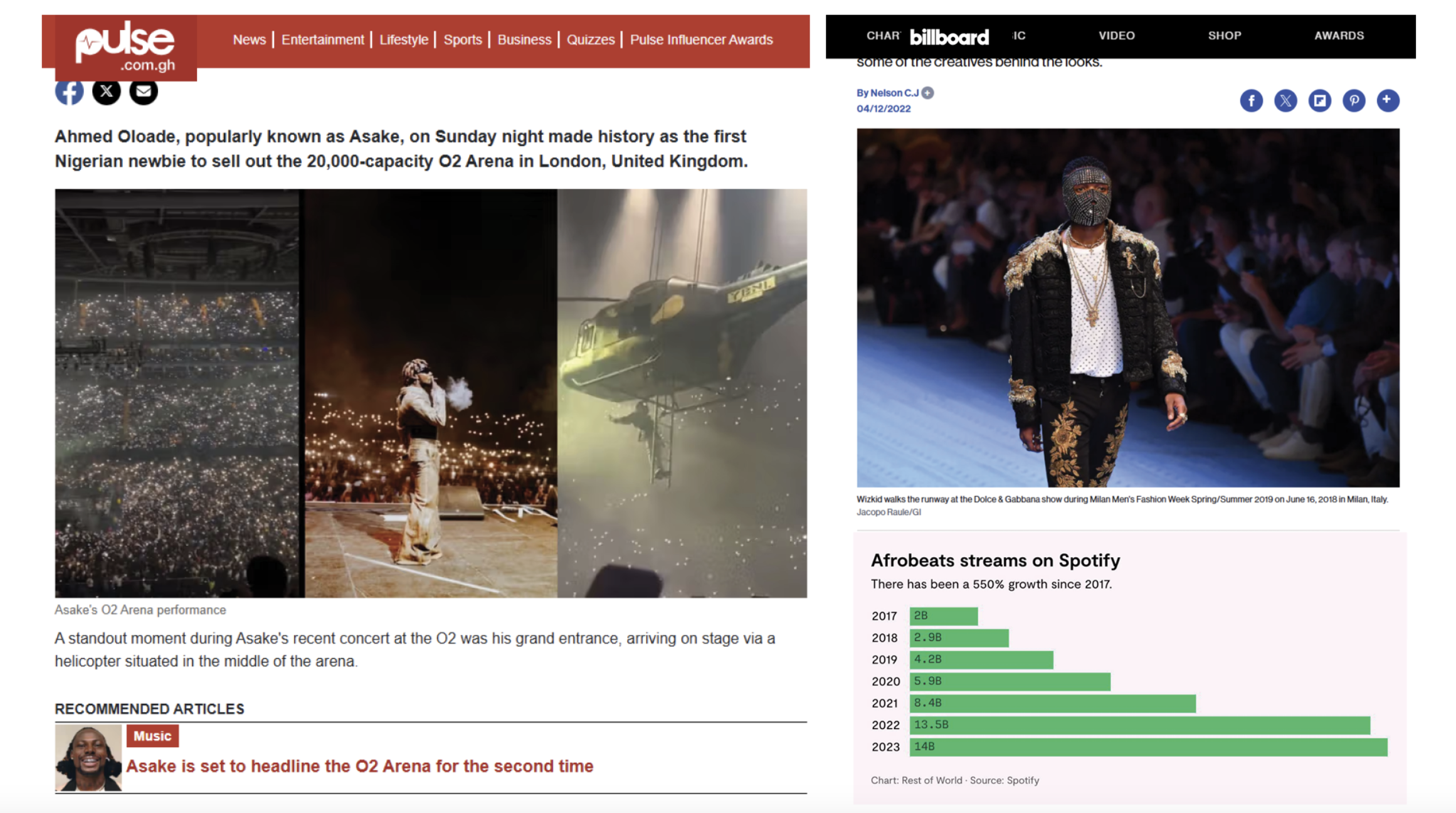West African’s culture rise
From music to fashion to cinema, West African culture is undeniably having a moment on the global stage. As someone deeply interested in branding, cultural anthropology, and societal shifts, I’m always curious to understand and contextualize new trends that are reshaping the global cultural landscape. This topic fascinates me from both a branding and cultural anthropology perspective.
We've seen this before with Japanese manga and anime, and more recently with the Korean wave of K-pop and K-dramas. Now, we are witnessing West Africa’s turn to shine. What started as an engagement within the diaspora has blossomed into a worldwide phenomenon. At this point, this isn't a weak signal anymore; it's an obvious trend with substantial impact.
On Spotify, Afrobeats streams have grown by a staggering 550 percent since 2017. Nigeria’s Burna Boy became the first international Afrobeats artist to land a No. 1 album in the U.K., and Rema's remix with Selena Gomez hit 1 billion streams on Spotify. Stars like Wizkid, Asake, and Burna Boy are regularly selling out massive arenas like London’s O2 and New York’s Barclays Center.
The Nigerian spirit and branding success
The narrative of Afrobeats traces back to the 60s and 70s when legendary Nigerian musician and political figure Fela Kuti coined the term 'Afrobeat,’ fusing American blues, jazz, and funk with traditional Yoruba music. This blend transcended Nigeria’s borders and echoed globally. By the late 1990s, a new wave of Nigerian artists emerged, leveraging digital technology, hip hop, and dancehall to create catchy, upbeat tunes for an evolving audience. Thus emerged “Afrobeats” (with an ‘s’), distinct from Fela’s Afrobeat, symbolizing a dynamic evolution of the genre.
Rooted in the ethos of "Naija no dey carry last," Nigeria's unofficial national motto, Nigerians never give up, regardless of the circumstance or situation. This phrase embodies their relentless spirit to always strive to find a way to emerge stronger. Today's artists embody the Nigerian spirit of making things bigger, shinier, more powerful, and more influential. They're not afraid to tap into their roots and culture, finding inspiration and new expression in their heritage and staying true to their sound rather than diluting it to appeal to Western ears. New fans around the world are singing along to songs in Yoruba, Igbo, Hausa, and Pidgin English, something that was not as common on this scale just five years ago.
From a branding perspective, this authenticity and willingness to experiment is a recipe for success, whether you are a multinational corporation, startup, or emerging artist. Additionally, word of mouth, the oldest marketing method, still plays a significant role in promoting Nigerian artists. The Nigerian diaspora, spread across the globe, is undoubtedly a key driver of this phenomenon. Information about their favorite artists spreads quickly and effectively, whether it’s personal news or new single drops. High engagement drives high brand awareness, and social media channels like TikTok are effortlessly spreading new dances and songs globally.
Sources: Pulse Ghana, Billboard, Spotify
Media and advertising industries take notice
The media and advertising industries are keenly aware of this trend. Alison Bringé, CMO at Launchmetrics, notes, "Brands are looking for ways to diversify themselves, diversify the audiences that they’re reaching, and Afrobeats is a great way to lean into that". For example, Burna Boy, alongside Brazilian megastar Anitta, headlined the 2023 UEFA Champions League final in Istanbul, showcasing the appeal of non-Western entertainment for FIFA. Rema and Ayra Starr were signed by Pepsi Nigeria as ambassadors, highlighting the commercial potential of these artists.
Grammy recognition
A pivotal moment for African music came when the Grammy Awards announced a new category: Best African Music Performance. Previously, music that didn’t fit into existing categories was placed under world music. Recognition from such a prestigious music award ceremony highlights the times we’re living in and shows Africa as a louder and more influential voice. Although the first generation of nominees are primarily Afrobeats and Amapiano artists, this might just be the tip of the iceberg. The surge in popularity of African content is the latest iteration of media globalization. I wonder how many other influences from the continent are yet to be discovered. As globalization continues, people will become more open to unique ethnographic content from around the world.
Rich cultural heritage and unique storytelling
“Global media consumers, particularly younger, more diverse, and tech-savvy audiences, are looking for representation and authenticity in the content they consume”
— Victoria Popoola, Co-Founder and CEO of TalentX Africa,
There's a growing interest in stories that resonate with consumers' experiences or provide insights into different cultures and perspectives. The diasporan market is also significant, with a strong desire for content that reflects their roots and heritage. Many believe that Nollywood, the Nigerian film industry, might be the next cultural content export. Regardless of what comes next, the rich African cultural heritage combined with unique storytelling has already made a significant mark.
The future of global media
I believe the Western world has exhausted many of its cultural resources and is now seeking inspiration from hidden, undiscovered corners of the globe. This shift is not only refreshing but necessary for the evolution of global media. As West African culture continues to captivate audiences worldwide, it paves the way for other regions to share their stories and influence the global narrative.
In conclusion, the rise of West African content in global media is more than just a trend; it's a testament to the power of cultural authenticity and the desire for diverse, representative storytelling. These societal shifts are here to stay, shaping the future of global media in exciting and unexpected ways.

